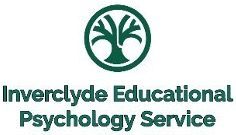Educational psychologists work to improve the learning and wellbeing of children and young people.
We work with and on behalf of children and young people who experience a wide range of additional support needs (ASNs).
“Our work is focused on building on the strengths of children, young people, parents, carers, families, teachers, education staff and other professionals, with the purpose of achieving the best outcomes for children and young people, particularly Inverclyde’s most vulnerable pupils.”
Wellbeing sits at the heart of the Getting it right for every child (GIRFEC) approach and reflects the need to tailor the support and help that children, young people and their families are offered to support their wellbeing.
A child or young person’s wellbeing is influenced by everything around them and the different experiences and needs they have at different times in their lives.
Following the GIRFEC approach, the following eight indicators are used to help make sure everyone has a shared understanding of what wellbeing means.

Credit: Scottish Government (2016) https://www.gov.scot/binaries/content/gallery/publications/advice-guidance/2016/03/getting-right-child-understanding-wellbeing-leaflet/j424072_g01.gif
The process of becoming an educational psychologist in Scotland
To qualify as an educational psychologist in Scotland, it takes a minimum of seven years of full-time study and training. This includes:
- Accredited honours degree in Psychology, or equivalent qualification, providing Graduate Basis for Chartered membership (GBC) of the British Psychological Society. This is a four year degree in Scotland.
- Minimum of two years work experience with children and young people, e.g. as teachers, social workers, counsellors, family support worker, early years practitioner…
- Three years of post-graduate professional and academic training, including:
-
- A two-year, full-time Master of Science degree accredited by the British Psychological Society (BPS),
- One year of supervised practice in a psychological service accredited by the BPS,
- Successful completion of the Doctoral Level Qualification in Educational Psychology (Scotland)
- or
- Three-year Professional Doctorate in Educational Psychology
- Eligibility to apply to be a Chartered Psychologist of the BPS and Full Membership of the Scottish Division of Educational Psychology
- Membership of the Health and Care Professions Council, which is the regulatory body for all educational psychologists
Credit: University of Dundee (2019) MSc in Educational Psychology Programme Handbook 2019-2021.


